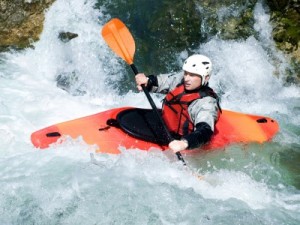 Second largest in the U.S., the state of Texas harbors 15 major rivers and 3,700 streams that course 191,000 miles throughout the state – most are shallow and smooth, waterways are wide and most are publicly accessible.
Second largest in the U.S., the state of Texas harbors 15 major rivers and 3,700 streams that course 191,000 miles throughout the state – most are shallow and smooth, waterways are wide and most are publicly accessible.
If you’re feeling more on the adventurous side, you will also find – with a little planning – heart-pounding, frothy whitewater as well as the more gentle riffles.
Open 365 days a year – where river flow permits – all Texas whitewater parks are free. One of Texas’ whitewater parks, Rio Vista Whitewater Park is located in the city of San Marcos. You can play in the standing waves and traverse a manicured course where there are no sharp rocks, foot entrapments or other hazards, and it features a constant temperature of 70-degrees all year round as well as nighttime lighting.
Large standing waves or rock gardens that require basic maneuvering skills as well as frothy rapids define whitewater that is rated as class 2 or class 3 on the International Scale of River Difficulty. San Antonio offers one of the longest stretches of whitewater – totaling 75 miles – in the state on the Guadalupe River. Beginning in Center Point, one of the more popular day trips will take you 9.5 miles downriver to Comfort. Feeling more adventurous? Take the 45-mile kayak/camping weekend adventure that continues on from Comfort even further downstream.
In the Texas hill country, adrenaline junkies can enjoy class 4 and class 5 whitewater courses that take you down narrow creeks. Springtime and late summer rains produce the best kayaking experience as the waterways swell and flow down steep gradients. Dropping 32 feet per mile through the city of Austin, little Walnut Creek is a popular urban run touting class 4 whitewater. If you’re looking to get away and into a more rural setting, Cherokee Creek near Colorado Bend State Park will provide more heart pounding whitewater for you thrill seekers!
Houston’s 26-mile-long Buffalo Bayou Paddling Trail affords a new perspective on Texas’ largest city. This trail starts at Texas 6 and follows the bayou 26 miles to Allen’s Landing in downtown Houston. That’s too far to complete in one day, but nine access points make it possible to choose paddles ranging from 15 minutes to a few (or many) hours.
A Personal Floatation Device for each paddler is required by Texas and children under the age of 13 are required to wear on at all times while on the water. During times of low visibility – sunrise, sunset, fog or rain – a sound-signaling device (like a police whistle) and a flashlight or other source of white light is required onboard.
For more information visit the Texas Paddling Trails.
Source: www.usatoday.com
Follow Us: Facebook – Foursquare – Twitter – YouTube – LinkedIn Contact Us
